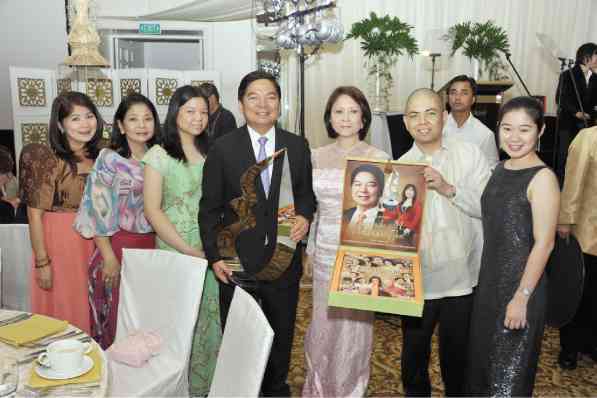The ‘boring’ man who kept things affordable
In the wake of the 2008 global financial crisis, Bangko Sentral ng Pilipinas (BSP) Governor Amando Tetangco Jr. was faced with an unusual problem.
In response to weak growth in developed countries, the world’s largest and most influential central banks had cut interest rates to historic lows.
The rationale espoused by the US Federal Reserve is that making money so cheap would force more businesses to borrow, and hopefully use these funds to expand operations, hire more people and encourage growth-inducing consumption.
What they failed to foresee is that not all of the funds from US and Europe went into productive enterprises. Thanks to porous financial borders, many bankers and fund managers simply went shopping for higher yielding securities overseas. And some of those higher-yielding assets could be found in the Philippines.
So by 2011, the dollars were flowing into the country nonstop, in part encouraged by the government which had promised a massive infrastructure buildup program where these funds would be productively utilized.
“But the Philippine economy was not structurally ready to absorb all these inflows,” Tetangco said during an interview about one of the most crucial challenges he faced as governor. “Since these funds were not being used productively, they could be inflationary, and we don’t want that.”
Simply put, the BSP was worried that too much money in the local economy chasing the same amount of goods and services would encourage both would-be buyers and sellers to raise their prices. The result would be the one thing central bankers fear most: inflation—an increase in consumer prices that always hits the poor hardest, and often results in economic stagnation.
To combat this problem, the BSP created a special deposit facility which offered banks (the main conduits for this massive flood of dollars) significantly higher interest rates for keeping their money with the central bank instead of releasing them into the market.
The response of banks was overwhelmingly positive. The amount of cash lodged with BSP’s special deposit account (SDA) swelled to P2 trillion by 2013, equivalent to around 20 percent of the Philippine economy’s size at that time. This is money that would have otherwise gone into unproductive activities like economic bubble-inducing property market speculation.
Unfortunately, this meant that BSP would also have to pay banks to keep their money in the central bank’s vaults. By 2013, the central bank was in the red by almost P200 billion. The losses continued for a few more years, abating only recently when cash sloshing around in global financial markets started to make their way back home to developed economies like the US, Europe and Japan.
Yet few people outside financial circles knew the gravity of the problem. Fewer still understood how close the country was to a major inflation crisis, averted only by decisive action on the part of the central bank.
“Of course, we don’t advertise what we’re doing here, but that’s how we do things at the central bank,” Tetangco said. “We like it when things are boring. And when things are exciting, we try to face them calmly.”
That equanimity—that poker face even when holding a weak hand of cards—is one thing that Tetangco has mastered in his years at the BSP.
Even reporters covering the central bank know that it is nearly impossible to elicit a telling facial reaction from the BSP governor even when faced with rapidly evolving problems like the 1997 East Asian financial crisis or the most recent one precipitated by the collapse of Lehman Brothers in the late 2000s.
“Predictability is one of his best traits,” said Bloomberg News’ Manila bureau chief Clarissa Batino. “He is one of the most predictable central bank governors in the region when it comes to implementing monetary policy. Analysts rarely get it wrong in terms of [predicting] his policies, and that’s a good thing.”
And while journalists invariably want to see more exciting quotes from their sources, those covering the BSP concede that Tetangco’s penchant to use “boring” central bank jargon to explain what would otherwise be seen as eye-popping crises when explained in layman’s terms was effective.
Today, a little over a month before his retirement, Tetangco marvels at how much the Philippine economic landscape has changed.
In 1974, when he joined the Central Bank of the Philippines (BSP’s predecessor which went bankrupt in the early 1990s after supporting the Marcos-era Oil Price Stabilization Fund), he was hoping for little else than a stable job during an unstable time in the country’s history.
Fast forward 42 years later, and Tetangco—now at the pinnacle of his career and acknowledged internationally as one of the world’s best central bank governors—has just finished solving another challenging would-be crisis for the country. He looks back at the landscape of the Philippine economy and admits being amazed the inflation rate remains at low single digits where double-digit price hikes was the norm as recent as the 1990s.
That low inflation regime is the doing mainly of the central bank under Tetangco.
“It’s a very different situation today from where we were only a few years ago,” the BSP chief said. “Whereas we were perennially faced with capital outflows before, now we have to grapple with too much inflows. If left unchecked, that, too, is bad.”
“Balance is essential,” he said in response to this reporter’s attempt to coax a more quotable quote out of him.
Balance. It’s sounds like boring advice for the people who will be left running the Philippine economy when he leaves the stage after four decades of public service. Boring, but important.















